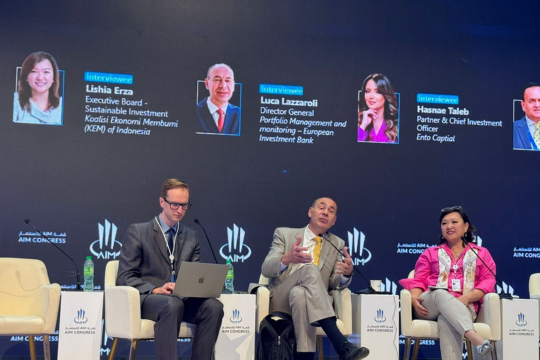Towards 8 Percent Economic Growth with Sustainable Businesses
Head of the Executive Board of Koalisi Ekonomi Membumi (KEM), Gita Syahrani, stated that Sustainable Businesses could help achieve Indonesia's economic growth target of 8 percent. Sustainable Businesses aim to promote restorative economic activities based on biodiversity by connecting businesses, government, and investors.
Koalisi Ekonomi Membumi has been promoting Sustainable Business innovation for the past two years. This program seeks to implement a restorative economy through agroforestry and regenerative agriculture in a collaborative manner. Their target audience includes business actors involved in the management of Natural Resources (SDA), such as farmers, plantation owners, and fishermen. “We believe that Indonesia's economic growth target of 8 percent for 2025-2029 can be realized through a biodiversity-based economy. Sustainable Businesses will help make this happen,” said Gita during the "Greenovator Monologue: Collective Movement Transformation: Driving Indonesia’s Restorative Economy" session at the Sustainability Action for the Future Economy (SAFE) 2024 event organized by Katadata at the Kempinski Hotel, Jakarta, on Thursday (8/8).
In general, a restorative economy is an economic model that meets human needs while simultaneously preserving the environment and social order. Restorative economics also focuses on developing local entities collectively and collaboratively, with holistic innovation.
The 2023 Climate Breakthrough Award recipient mentioned that KEM also supports the capacity building of business actors such as fishermen or coffee farmers. Business actors who need to scale up their operations while remaining environmentally responsible will be assisted through a collaborative value chain approach to connect with investors, enablers, and other supporting actors. Gita also referenced the CELIOS Study, which outlines three fundamental principles of the New Economic Paradigm.
First, it emphasizes restoring ecosystem functions, and the structure of ecological and social objects, including human-nature relationships. Next is prioritizing collective action with an emphasis on local community management of natural resources. Finally, it supports poverty alleviation, reduces inequality, and fosters peace and security. “We aim to have 100 sustainable businesses, 100 jurisdictions rich in forests and peatlands committed, and channel funding of up to US$ 200 million,” said Gita.
The establishment of Koalisi Ekonomi Membumi was initially aimed at finding a balance between the downstream processing of mineral resources and the wealth of Indonesia's natural resources. Gita noted that while the downstream processing of mineral resources has been a government priority, Indonesia's plantation and biodiversity sectors are equally abundant. For instance, she highlighted mineral resources such as nickel and coal, which are projected to account for 91.72 percent of the national downstream investment target. In contrast, the forestry, agriculture, and marine sectors make up less than 10 percent of Indonesia's downstream investment target. “Therefore, in Indonesia, the government needs to prioritize bioeconomy, which creates resilient farmers, fishermen, and plantation owners. Our biodiversity will be preserved by them,” added Gita.
KEM's journey began two years ago, although it was only officially established two months ago. Bringing together 34 organizations and movements focused on climate action and restorative economics, Gita introduced several entities present at the event. For example, KEM's policy advocacy team includes Traction Energy Asia, Lingkar Temu Kabupaten Lestari, and the non-profit organization CDP. Meanwhile, the enabler and pipeline functions are led by Krealogi, Supernova Ecosystem, Pratisara Bumi Foundation, and Tanah Air Lestari. The investment and fundraising team includes Swadaya, Angin, Supernova Equatorial, and Katalys Partners. The communication team is comprised of Idelaju, Cleanomic, and Coaction. Also present were two KEM Executive Board members, Lishia Ezra and Okky Arifiandi, along with Senior Manager Fito Rahdianto.
Sustainability Action for the Future Economy (SAFE) is an annual forum organized by Katadata Indonesia since 2020. SAFE discusses issues and solutions for sustainable economic development. The forum brings together all stakeholders: government, corporations, and industries, civil society organizations, and the public to explore experiences, strategies, and concrete actions for a sustainable economy in Indonesia. This year, with more than 40 expert and professional speakers, SAFE focused on several strategic topics related to green economy development, such as Indonesia's carbon market, industrial decarbonization acceleration, energy transition, electric vehicle ecosystem development, sustainable finance, circular economy, and various community initiatives in supporting sustainability and nature conservation issues.

